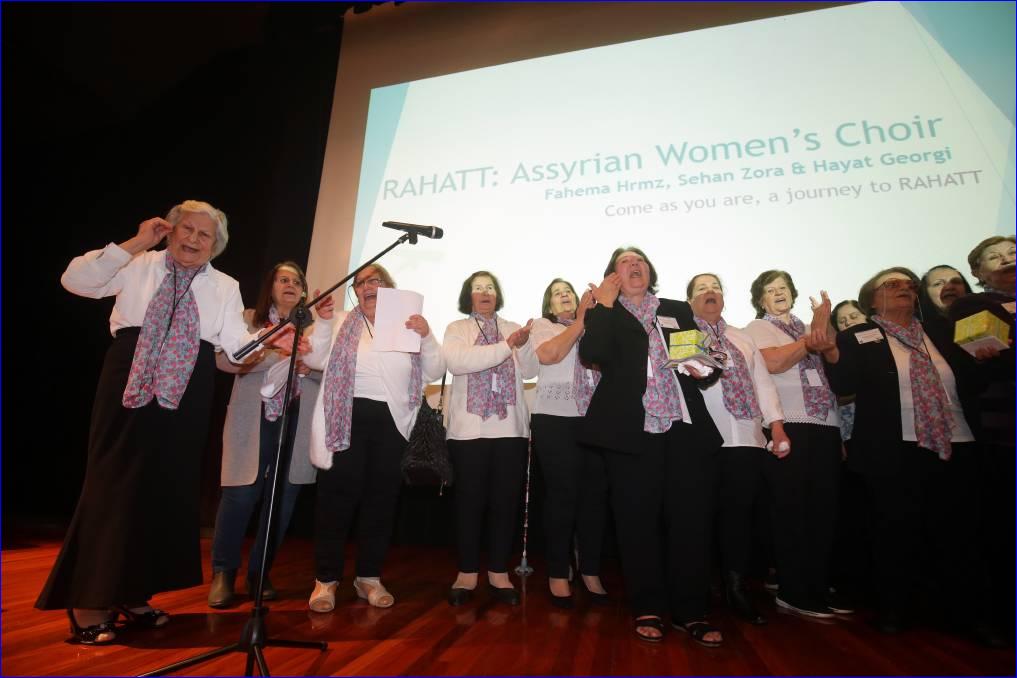


For the women of the Assyrian Women's Choir, singing is hope.
It is freedom. It is a form of expression.
The sound is not important. The lyrics are secondary.
What is evident is the joy in their faces when they belt out a tune.
You see, the majority of the woman were not allowed to sing in their home countries of Iraq and Syria. It was one of the many things that was frowned upon.
Many of the group of 20 or so ladies were in the same boat when they arrived in Australia: looking to forget the past and embrace the future.
Enter the choir which is part of the RAHATT (Reconnection And Healing after Trauma and Transition) group provided by STARTTS (NSW Service for the Treatment and Rehabilitation of Torture and Trauma Survivors).
The RAHATT group meets every Friday with a regular group of mature aged (55-- 84 years) Arabic speaking refugee women who are mostly indirectly victims of the violence and human rights violation following the conflicts in Iraq and Syria.
It began as a clinical group to talk about the pain and grief that were going through after ISIS invaded North Iraq.
It has developed to include different activities -- including kniting, tango and singing.
Fairfield mother and daughter Ameera Jirjees, 84,and Amel Matti, 65, came to Australia in 2009 from Iraq after Ameera's son was killed in the army.
Speaking through an interpreter she said after their safety was threatened she decided to come to Australia. In 2014, the pair joined the RAHATT group after her husband died.
"The group has helped us forget what we have been through," she said.
"Singing helps us relieves our stress and forget the bad memories of the past. In Iraq, it is shameful if a women sings or goes to a function."
The group were in full voice at STARTTS' Refugee Communities in Cultural Transition (CiCT) forum on Friday. The two-day event featured speakers representing more than 20 refugee communities in NSW and provided an opportunity to learn from the experiences of new and established communities and address the challenges they face in gaining a sense of acceptance.
Some of the special guests speakers included Refugee Council of Australia chief executive Paul Power and human rights activist Dr Munjed Al Munderis.
The forum plays and important part in enabling a number of communities from refugee backgrounds to better support their members in their healing journeys.
For Hayat Georgi, the main singer of the Assyrian Women's Choir, her journey has gone from Syria to Australia. She fled in 2014 due to the war.
"There were bombings and we couldn't be safe, so we left," she said.
"RAHATT has given me relief from stress and singing makes me happy. It helps that I have a good voice too."
Co facilitator of RAHATT Pearl Fernandes said singing and dancing were important for older woman who were often "neglected".
"It's a way to connect them back to their culture," she said.
"Part of their grief was losing their culture and losing their normal way of life and things they enjoyed so we started provided different activities including singing and dancing.
"Singing is a therapeutic activity and singing songs from their culture is a way to communicate with the next generation."
Three member of the group spoke on stage at the forum about how the group has helped them not only cope with issues related to refugee trauma and grief related to death of family members, but also dealing with the pain and loss of one's homeland.
The woman have naturally formed a bond (usually over shared plate of food) as they deal with the challenge of transitioning to a new country and dealing with a new stage of life.

or register to post a comment.